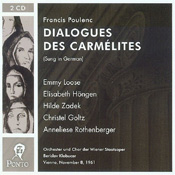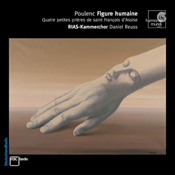Recently in Recordings
The Sixteen continues its exploration of Henry Purcell’s Welcome Songs for Charles II. As with Robert King’s pioneering Purcell series begun over thirty years ago for Hyperion, Harry Christophers is recording two Welcome Songs per disc.
In February this year, Albanian soprano Ermonela Jaho made a highly lauded debut recital at Wigmore Hall - a concert which both celebrated Opera Rara’s 50th anniversary and honoured the career of the Italian soprano Rosina Storchio (1872-1945), the star of verismo who created the title roles in Leoncavallo’s La bohème and Zazà, Mascagni’s Lodoletta and Puccini’s Madama Butterfly.
Collapsology. Or, perhaps we should use the French word ‘Collapsologie’ because this is a transdisciplinary idea pretty much advocated by a series of French theorists - and apparently, mostly French theorists. It in essence focuses on the imminent collapse of modern society and all its layers - a series of escalating crises on a global scale: environmental, economic, geopolitical, governmental; the list is extensive.
Amongst an avalanche of new Mahler recordings appearing at the moment (Das Lied von der Erde seems to be the most favoured, with three) this 1991 Mahler Second from the 2nd Kassel MahlerFest is one of the more interesting releases.
If there is one myth, it seems believed by some people today, that probably needs shattering it is that post-war recordings or performances of Wagner operas were always of exceptional quality. This 1949 Hamburg Tristan und Isolde is one of those recordings - though quite who is to blame for its many problems takes quite some unearthing.
The voices of six women composers are celebrated by baritone Jeremy Huw Williams and soprano Yunah Lee on this characteristically ambitious and valuable release by Lontano Records Ltd (Lorelt).
As Paul Spicer, conductor of the Royal Birmingham Conservatoire Chamber Choir, observes, the worship of the Blessed Virgin Mary is as ‘old as Christianity itself’, and programmes devoted to settings of texts which venerate the Virgin Mary are commonplace.
Ethel Smyth’s last large-scale work, written in 1930 by the then 72-year-old composer who was increasingly afflicted and depressed by her worsening deafness, was The Prison – a ‘symphony’ for soprano and bass-baritone soloists, chorus and orchestra.
‘Hamilton Harty is Irish to the core, but he is not a musical nationalist.’
‘After silence, that which comes closest to expressing the inexpressible is music.’ Aldous Huxley’s words have inspired VOCES8’s new disc, After Silence, a ‘double album in four chapters’ which marks the ensemble’s 15th anniversary.
A song-cycle is a narrative, a journey, not necessarily literal or linear, but one which carries performer and listener through time and across an emotional terrain. Through complement and contrast, poetry and music crystallise diverse sentiments and somehow cohere variability into an aesthetic unity.
One of the nicest things about being lucky enough to enjoy opera, music and theatre, week in week out, in London’s fringe theatres, music conservatoires, and international concert halls and opera houses, is the opportunity to encounter striking performances by young talented musicians and then watch with pleasure as they fulfil those sparks of promise.
“It’s forbidden, and where’s the art in that?”
Dublin-born John F. Larchet (1884-1967) might well be described as the father of post-Independence Irish music, given the immense influenced that he had upon Irish musical life during the first half of the 20th century - as a composer, musician, administrator and teacher.
The English Civil War is raging. The daughter of a Puritan aristocrat has fallen in love with the son of a Royalist supporter of the House of Stuart. Will love triumph over political expediency and religious dogma?
Beethoven Symphony no 9 (the Choral Symphony) in D minor, Op. 125, and the Choral Fantasy in C minor, Op. 80 with soloist Kristian Bezuidenhout, Pablo Heras-Casado conducting the Freiburger Barockorchester, new from Harmonia Mundi.
A Louise Brooks look-a-like, in bobbed black wig and floor-sweeping leather trench-coat, cheeks purple-rouged and eyes shadowed in black, Barbara Hannigan issues taut gestures which elicit fire-cracker punch from the Mahler Chamber Orchestra.
‘Signor Piatti in a fantasia on themes from Beatrice di Tenda had also his triumph. Difficulties, declared to be insuperable, were vanquished by him with consummate skill and precision. He certainly is amazing, his tone magnificent, and his style excellent. His resources appear to be inexhaustible; and altogether for variety, it is the greatest specimen of violoncello playing that has been heard in this country.’
Baritone Roderick Williams seems to have been a pretty constant ‘companion’, on my laptop screen and through my stereo speakers, during the past few ‘lock-down’ months.
Melodramas can be a difficult genre for composers. Before Richard Strauss’s Enoch Arden the concept of the melodrama was its compact size – Weber’s Wolf’s Glen scene in Der Freischütz, Georg Benda’s Ariadne auf Naxos and Medea or even Leonore’s grave scene in Beethoven’s Fidelio.
Recordings

28 Aug 2006
POULENC: Figure Humaine and Dialogues des Carmelites
Francis Poulenc is well known for the religious works that comprise much of his oeuvre after he was traumatized by the accidental and premature death of his friend Pierre-Octave Ferroud in 1936.
Although Poulenc (1899 – 1963) had realized in the late 1920s that he was homosexual, the death of Ferroud triggered his return to Catholicism. Despite Poulenc’s renewed commitment to the faith of his childhood, his relationship with religion was a conflicted one. Additionally, Poulenc’s tendency toward intense melancholic emotions was further exacerbated by World War II.
Recently two recordings have been released on CD that feature two of Poulenc’s most highly acclaimed works, each of which reflect themes of religion and war, though the recordings couldn’t be more different from one another. Ponto has released a remastered recording of Dialogues des Carmélites (1953 – 6) performed by the Vienna State Opera on Nov. 8, 1961 under the baton of Berislav Klobucar; and Harmonia Mundi presents several of Poulenc’s works for a cappella choir, including Figure Humaine, performed by the RIAS-Kammerchor conducted by Daniel Reuss.
The Vienna State Opera recording of Dialogues des Carmélites (Die Gespräche der Karmeliterinnen) is a slice of history on a CD. The recording, which includes Emmy Loose as Blanche, Elisabeth Höngen as the old Prioress, Hilda Zadek as the new Prioress, and Christel Goltz as Mother Marie, is a live recording replete with audience noise and applause. The Ponto label, owned by Mitridate, specializes in releasing unique live recordings that are not otherwise available on CD. In this day of digital touching-up and pristine production, it is refreshing to hear artifacts of live performance on a recording. While it is disconcerting to hear Dialogues sung in German instead of French, one need only consider that the opera was premiered in Italian at La Scala to be reminded that “authenticity” in performance is ever unattainable.
The enthusiast will likely be frustrated by the lack of information in the booklet that accompanies the two-CD set. Limited notes on the circumstances of the opera’s composition, a synopsis of the opera, and bios of the lead singers are provided in English by Andrew Palmer. However, the tracks are labeled in only by their German titles, and there is no libretto, in German or otherwise. Furthermore, there is no information on the specific circumstances surrounding this particular production of Dialogues by the Vienna State Opera. The operatic voice fanatic, however, will be delighted to have some of the greatest women to sing at the Vienna State Opera on a single recording. Unfortunately, a cursory search of several major record retailers indicates that this recording may be difficult to track down should one want to purchase it. Mitridate appears to be based in the Netherlands, and only has one distributor listed, also apparently in the Netherlands. [Editor's Note: Ponto is distributed in the U.S. through Qualiton Imports Ltd.]
 In contrast, RIAS-Kammerchor’s recording of Figure Humaine and other of Poulenc’s choral works is highly accessible in all senses of the word. Daniel Reuss directs this highly polished performance of Poulenc’s Sept Chansons (1936), Un Soire de Neige (1944), Figure Humaine (1943), Quatre Petites Prières de Sainte Françsis d’Assise (1948), and Chanson à Boire (nd). These performances are simply wonderful: Each piece is sensitively interpreted and beautifully textured. Reuss and his choir do a stunning job of presenting Poulenc in all his seriousness, melancholy, and concern for humanity. The final work is a short coda to the rest of the CD; Chanson à Boire is a drinking song that reveals Poulenc’s more light-hearted and mischievous side.
In contrast, RIAS-Kammerchor’s recording of Figure Humaine and other of Poulenc’s choral works is highly accessible in all senses of the word. Daniel Reuss directs this highly polished performance of Poulenc’s Sept Chansons (1936), Un Soire de Neige (1944), Figure Humaine (1943), Quatre Petites Prières de Sainte Françsis d’Assise (1948), and Chanson à Boire (nd). These performances are simply wonderful: Each piece is sensitively interpreted and beautifully textured. Reuss and his choir do a stunning job of presenting Poulenc in all his seriousness, melancholy, and concern for humanity. The final work is a short coda to the rest of the CD; Chanson à Boire is a drinking song that reveals Poulenc’s more light-hearted and mischievous side.
The album contains brief program notes by Hervé LaCombe that situate Poulenc as a member of Les Six and as a first-class setter of poetic texts. In addition, LaCombe’s notes and all the texts of the songs are included in the booklet in French, English, and German, as well as information on the RIAS-Kammerchor and photos of the choir and Reuss. Paul Eluard’s surrealist poetry was Poulenc’s gateway to recovering his Catholic spirituality, and this debt is apparent in that the first three works on the recording are settings of texts by Eluard (Sept Chansons contains texts by Apollinaire in addition to Eluard). Furthermore—and luckily—the CD is available widely from retailers. Aficionados will appreciate this the new availability of some Poulenc’s music that is not too frequently recorded. Someone who is not familiar with Poulenc’s music will find this recording to be a delightful introduction.
Megan Jenkins
CUNY – The Graduate Center

 In contrast, RIAS-Kammerchor’s recording of Figure Humaine and other of Poulenc’s choral works is highly accessible in all senses of the word. Daniel Reuss directs this highly polished performance of Poulenc’s Sept Chansons (1936), Un Soire de Neige (1944), Figure Humaine (1943), Quatre Petites Prières de Sainte Françsis d’Assise (1948), and Chanson à Boire (nd). These performances are simply wonderful: Each piece is sensitively interpreted and beautifully textured. Reuss and his choir do a stunning job of presenting Poulenc in all his seriousness, melancholy, and concern for humanity. The final work is a short coda to the rest of the CD; Chanson à Boire is a drinking song that reveals Poulenc’s more light-hearted and mischievous side.
In contrast, RIAS-Kammerchor’s recording of Figure Humaine and other of Poulenc’s choral works is highly accessible in all senses of the word. Daniel Reuss directs this highly polished performance of Poulenc’s Sept Chansons (1936), Un Soire de Neige (1944), Figure Humaine (1943), Quatre Petites Prières de Sainte Françsis d’Assise (1948), and Chanson à Boire (nd). These performances are simply wonderful: Each piece is sensitively interpreted and beautifully textured. Reuss and his choir do a stunning job of presenting Poulenc in all his seriousness, melancholy, and concern for humanity. The final work is a short coda to the rest of the CD; Chanson à Boire is a drinking song that reveals Poulenc’s more light-hearted and mischievous side.